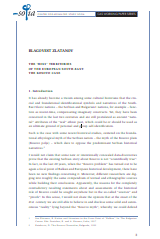Autochthonism and National Ethnology in Romania
Autochthonism and National Ethnology in Romania
Author(s): Vintilă Mihăilescu
Subject(s): Anthropology, History and theory of political science, Sociology of Culture
Published by: Centre for Advanced Study Sofia (CAS)
Keywords: National Anthropology;
Summary/Abstract: What are we referring to when we speak about the history of Romanian ethnology or anthropology? It seems easy, even obvious, but the very field(s) of what we are referring to by these academic labels do not just exist “out there” waiting to be approached and understood. As a matter of fact, „ethnology” was a term used only incidentally in Romanian professional jargon before 1990, whereas the term „anthropology” found use alone in the field of physical anthropology. What is more: beyond the institutional borders (which took time to emerge and achieve legitimacy), one might question where the limits of „ethnological thinking” lie in the broad context of the social thinking of early modern times, where the involved elites shared an interest in „the being of the people” and most approaches were conceived as „national sciences”? Contrary to what one might think, there is not an easy and ready-made answer to this question. Let us then ask what we should refer to when we speak about the history of Romanian ethnology? We might begin with the classical couple of folklore studies and ethnography, which both have a long and rich tradition in Romanian modern culture. The next step would be to link them in a mutually comprehensive approach, despite the general practice of presenting them independently in specifi c histories. In doing so, we could adopt the recommendation of an international conference of European “folk ethnographers” held in 1955 in Arnhem to use the general term of “national ethnology” when referring to all kinds of scholars of “folk culture” within a national realm (see Tamás, 1968). But to frame the question in this fashion would be misleading to some extent. Folk studies and ethnography transcend the “academic” realm in their claim to have the last word on “the being of the people”, as Pârvan explicitly states when defi ning ethnography. Folkloric species and categories, as defi ned by the different schools and approaches, have as their only common point “their documentary value, all the goods of the fi eld [of folk studies, n.n.] being documents of popular mentality” (Bîrlea, 1969:7). Thus, the two disciplines share, in fact, their object of interest; but in doing so, they also share it with many other disciplines and approaches. Indeed, “the being of the people” is a general concern of the national elites during this entire period, most of them contributing in a more or less specialized way to its investigation. [...]
Series: CAS Sofia Working Papers
- Page Count: 26
- Publication Year: 2007
- Language: English
- Content File-PDF

